-
Euro is turning lower today, after some gains earlier. Now, though, the 17-nation currency is falling back as Forex traders try to determine...
-
The US dollar gained today as signs of an economic slowdown in China damped risk appetite of investors and made them to return to the safety...
-
Vietnam //
-
Name: Jin Mei XiEnglish name: Olwen Jin Date of birth: August 21, Place of birth: Shandong Province Yantai City, China Height: 175 cm Weig...
-
As you'll recall from yesterday, there was one small detail that stood out in Microsoft's announcement of a new preview program for...
-
Chinese Stunning Model Anata Wang Ying
Max CPC
Domains yahoo $97.44
Domain name yahoo $79.81
Dc hair laser removal washington $68.91
Law lemon wisconsin $66.15
Hair removal washington dc $51.14
Domain registration yahoo $41.97
Benchmark lending $40.36
Domain yahoo $38.05
Yahoo web hosting $37.86
Hair laser removal virginia $37.29
Peritoneal mesothelioma $36.59
Ca lemon law $36.55
Best buy gift card $34.13
Adverse credit remortgage $31.10
Mesothelioma information $30.98
Law lemon ohio $29.77
Att call conference $29.34
Insurance medical temporary $29.10
Illinois law lemon $28.95
Mesothelioma symptoms $28.78
Angeles drug los rehab $28.51
Personal injury solicitor $28.26
Att go $28.23
Accident car florida lawyer $28.03
Google affiliate $27.11
At t wireless $27.11
100 home equity loan $26.31
Mcsa boot camp $26.28
Anti spam appliance $26.19
Adverse remortgage $26.17
Chicago hair laser removal $26.00
Att conference $25.98
At and t $25.84
Laser hair removal maryland $25.45
Mesothelioma $25.15
Buy gift card $24.88
Mesotheloma $24.80
Student loan consolidation program $24.52
California law lemon $24.45
Event management security $24.30
Canada personals yahoo $24.15
Orlando criminal attorney $24.15
Uk homeowner loans $23.78
Vioxx lawsuit $23.71
Mesothelioma $23.65
Compare life assurance $23.55
Criminal defense federal lawyer $23.34
American singles $23.29
Federal criminal defense attorney $23.09
Laser hair removal manhattan $23.07
Att prepaid wireless $23.03
Fortis health insurance temporary $23.00
Miami personal injury lawyer $22.93
Hair removal chicago $22.75
At and t cell phones $22.74
Refinance with bad credit $22.61
Malignant mesothelioma $22.47
Lease management software $22.45
Primary pulmonary hypertension $22.34
Miami personal injury attorney $22.27
Anti spam lotus notes $22.24
Life insurance quotes $22.23
Egg credit $21.91
Anti spam exchange server $21.80
Lemon law $21.77
Google adsense $21.67
Best consolidation loan student $21.67
Refinance with poor credit $21.63
Employee leasing $21.49
Student loan consolidation center $21.36
Buyer mortgage note $21.35
Federal student loan consolidation $21.34
Symptoms of mesothelioma $21.33
City hair laser new removal york $21.31
Att wireless com $21.20
San diego dui lawyer $21.15
Indiana law lemon $21.14
Structured settlement $21.05
Law lemon michigan $21.10
Angeles criminal defense los $20.80
Refinancing with poor credit $20.80
Home equity loan $20.64
Action class lawsuit vioxx $20.64
Term life assurance $20.49
E loan $20.47
Celebrex lawyer $20.46
Vasectomy reversal $20.37
Mortgage rates refinancing $20.36
Attorney law lemon $20.28
Consolidate student loans $20.28
Home equity loans $20.17
Mesothilioma $20.11
New york personal injury lawyer $19.99
Home equity loan rates $19.98
Auto insurance quotes $19.97
Georgia law lemon $19.93
Homeowner loans $19.90
Equity loan rates $19.73
Administration lease software $19.68
Egg credit card $19.63
Student consolidation loans $19.58
Microsoft anti spam $19.55
Mesothelioma prognosis $19.41
Second mortgages $19.29
21 auto century insurance $19.26
Employee florida leasing $19.25
Federal consolidation loan $19.21
Equity loan $19.17
Personal injury attorney colorado $19.14
Accident lawyer michigan $19.03
Refinancing with bad credit $19.02
Home equity line of credit rates $19.02
Federal consolidation $19.01
Non profit debt consolidation $18.96
Pay per click affiliate $18.95
City hair new removal york $18.86
Acid reflux disease diet $18.85
Refinance poor credit $18.77
Equity loans $18.75
Student loan consolidate $18.73
Consolidate loans $18.60
Secured loans $18.51
Criminal lawyer new york $18.49
Affiliate per click $18.43
Chicago personal injury lawyer $18.29
Los angeles dui lawyer $18.29
Att prepaid $18.19
Angeles criminal defense lawyer los $18.10
Critical illness insurance life $18.04
Irs lawyer tax $18.03
Laser hair removal new york $18.03
Comcast high speed $18.02
Personal yahoo $17.98
San diego dui attorney $17.78
Michigan personal injury $17.77
Automobile law lemon $17.73
Cheap insurance life term $17.66
Home loans refinancing $17.52
Consolidate college loans $17.51
Cheap life insurance $17.45
Vioxx law suit $17.38
Student loan refinance $17.32
Car hire alicante spain $17.30
Tax attorney $17.28
Refinancing my home $17.28
Criminal dallas lawyer $17.24
Line of credit home equity $17.24
Litigation vioxx $17.23
At and t phones $17.20
Criminal defense attorney los angeles $17.15
Commodity online trading $17.14
Home equity rates $17.13
Adsense $17.12
Law lemon mass $17.12
Equity home $17.11
Arizona law lemon $17.10
Child molestation attorney $17.09
Home line of credit $17.09
Alicante car rental spain $17.06
Attorney defense federal $17.03
San diego criminal attorney $17.02
Injury lawyer new york $16.79
Attorney injury new personal york $16.78
At and t mobile $16.77
Pleural mesothelioma $16.72
Augmentation breast diego san $16.61
Home equity poor credit $16.61
Health insurance temporary $16.60
Compensation mesothelioma $16.60
21st century insurance $16.60
Cheap insurance medical $16.52
Angeles criminal lawyer los $16.51
Low cost term life insurance $16.49
Home refinance loans $16.48
Eloan $16.45
Life insurance quote $16.44
Cheap life assurance $16.39
125 equity loan $16.33
Anti spam exchange $16.32
Credit equity home line $16.31
Att go phone $16.30
Dui florida lawyer $16.30
Hair removal new york $16.27
Merchant account international $16.14
Vioxx class action $16.11
125 home equity loan $16.10
Life insurance quote online $16.10
Consolidation loan $16.09
Equity line of credit $16.04
Carolina law lemon north $16.02
Equity rates $16.02
Direct home insurance line $15.87
Angeles attorney los tax $15.86
Credit home line $15.85
Term insurance $15.81
Auto insurances $15.81
Debtfreedirect $15.80
Refinance comparison $15.80
Acid reflux treatment $15.77
Bad credit mortgage refinance $15.77
College loan refinance $15.73
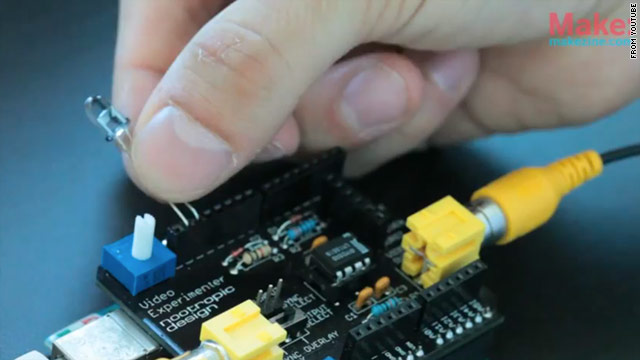
This DIY remote control, to be shown off at an upcoming conference, can turn the TV on mute when certain words are spoken
(CNN) -- When Matt Richardson works from his home in Brooklyn, New York, he likes to keeps the TV on to stay informed, but some celebrity or another is always taking up airtime and bugging him.
"A while ago it was Charlie Sheen. And then it was Sarah Palin. And then it was Donald Trump," said Richardson, who is a video producer for Make Magazine. "And after a while I realized there's sort of always someone who I don't really want to hear about."
Like any good hacker, Richardson decided to come up with a fix: He developed a do-it-yourself TV remote control that will automatically mute the television when certain celebrity names are mentioned.
He plans to debut and explain the hack at the upcoming Maker Faire event in New York. The name of his talk is "Enough Already: Silencing Celebs with Arduino."
Unless you're speaking at that do-it-yourself inventors' conference, you may be wondering: "What the heck is Arduino?" It's basically a piece of computer hardware that can be programmed to do anything you want. In this case, Richardson combined a couple of Arduino circuit boards with an infrared LED light -- that little red bubble on the front of your TV remote -- and programmed the whole thing to interact with a TV's closed-captioning system.
The DIY gadget reads the closed-captioning transcript as it's aired and then automatically mutes the television for 30 seconds when it picks up certain words. That list of unspeakables can be re-programmed (so if you really love Sarah Palin, don't worry -- you could mute President Obama or Sen. Harry Reid references instead).
As long as that person's name keeps coming up, the remote keeps muting the TV. The first time he got it to work, Richardson said he "was in silent bliss for that 30 seconds I didn't have to hear about Kim Kardashian."
The whole thing cost about $70 to make, he said, and he built and coded it in about a week, working only in his spare time. It's worth noting that this isn't a product Richardson expects to be commercialized -- it's just for fun. He posted the code online so other people can play around with it.
The implementation itself is pretty crude, he said. Closed captioning doesn't always appear in real-time, so sometimes the system will miss a first reference.
If you're interested, he explains the process in detail in a blog post.
In the comments below that post, Make Magazine readers chime in with all kinds of ways this sort of closed-caption-reading tech could be used.
"You could generate the list of key words dynamically. E.g., by monitoring Twitter's trending topics or by parsing Google's zeitgeist lists," one reader suggests.
Another wants to use it to mute all commercials:
"Does the CC (closed captioning) stream contain any kind of marker for indicating commercials? Because I'd tweak this in a heartbeat to mute the deliberately louder commercials that seem all the rage these days."
The Maker Faire, which is dedicated to all kinds of cool and bizarre crafts, machines, computer hacks and mousetraps, will be held September 17 and 18 in New York. You can see a full schedule on their website.
Neither Kardashian nor Snooki is expected to be in attendance.
A new federal loan guarantee will put 160,000 new solar installations on top of military housing in 34 states. See SolarCity in action.
NEW YORK (CNNMoney) -- Residential solar power provider SolarCity and the U.S. government announced a deal Wednesday to put solar panels on military housing units, a move that could double the number of rooftop solar power installed in the United States.
The complex plan calls for SolarCity to receive a $344 million Department of Energy-backed loan from financiers U.S. Renewables Group and Bank of America. (BAC, Fortune 500)SolarCity will then use the money to put up to 160,000 rooftop solar installations on top of privately run military housing complexes at 124 military bases across 34 states.SolarCity will own and operate the solar panels, and the companies that own the housing units will send amonthly check to SolarCity for the electricity.For the government, the deal allows the U.S. military to move toward its goal of getting 25% of its electricity from renewable power by 2025. It also furthers the Energy Department's goal of supporting the commercialization of solar power."This is the largest domestic residential rooftop solar project in history," Energy Secretary Steven Chu said in a statement announcing the deal. "It can also be a model for other large-scale rooftop solar projects that help America regain its lead in the solar industry."
Frontline troops push for solar energy
For SolarCity, which recently received major financial backing from Google (GOOG, Fortune 500), the deal is a windfall. The company has installed 16,000 rooftop units since its founding in 2006, so this program will boost its business by a factor of ten."This is a massive kick of momentum for the company," said Lyndon Rive, SolarCity's CEO and founder.Rive stressed how the deal is nearly risk-free for the lenders and government, with SolarCity putting up its own money for the panels and only getting reimbursed by its lenders after each project is complete.
The SolarCity news comes after a tough spell for the industry, with solar companies Solyndra and Evergreen going belly-up in the last couple of weeks.
The Energy Department also backed Solyndra, and the Obama administration has been taking heat for both that bad loan and for focusing too heavily on green jobs that some say haven't panned out.
The SolarCity award shows that the administration is not giving up its loan guarantee program or its push for green jobs. SolarCity predicts that the initiative will create 6,000 jobs over the next five years.
For the military clean energy saves lives
Rive says that his company, which takes a proven technology and works on distributing it, is a safer bet than a company like Solyndra, which made cutting-edge experimental products.
It was the loan guarantee from the government and SolarCity's willingness to use its own cash at first that enabled the firm to get such a low-interest loan from commercial lenders, Rive said.
And it's the low-interest loan that's making such a large project possible. Rive said many of the projects are taking place in states with no solar power subsidies. He's using the low capital costs and subsidies from other states to offset the higher costs in states with no incentives.
"Now the solar industry has a debt model that can make distributed generation affordable on a massive scale," he said.
In a bid to nurture the clean but expensive technology, the federal government subsidizes about 30% of the costs for solar deployments. State and local incentives can cover anywhere from zero to another 30%.
The federal government spends about $12 billion a year subsidizing all forms of renewable energy production, with the vast majority of that going to the wind and ethanol industries.

PocketNow discovered this photo, which alleges to be from an iPhone 4 but shows signs of being taken by something else.
(CNN) -- This time, it only took a plate of tasty-looking raw fish to crank up the iPhone rumor machine.Smartphone news and review blog PocketNow posted a photo late Wednesday night that they say might be one of the first taken with a version of Apple's yet-to-be-released iPhone update.The photo's embedded info claims that it was taken with an iPhone 4. But the smoking gun, according to the site, is the fact that the photo appears to have been cropped from a size requiring an 8-megapixel camera.The iPhone 4 has a 5-megapixel camera.Also (and this will require a little camera geekery) the site notes that the lens was recorded as a 4.3 mm f/2.4, which is closer to a point-and-shoot camera than the iPhone 4's 3.85 mm f/2.8.PocketNow doesn't name a source for the photo but, again unattributed, says it "supposedly" came from an Apple employee having lunch at work.Insert your own bitter "Apple employees get sushi at work" comment here.Mashable's Ben Parr writes that the photo came from the Flickr account of an Apple employee -- an account that has since been made private -- and that GPS data puts the photo's source at 1 Infinite Loop, the address of Apple's Cupertino, California, headquarters.Of course, PocketNow, which regularly searches photo sites for evidence of upcoming phones, notes that they've been fooled before. For example, by an iPhone photo that had been uploaded to an iPad, changing its image-file data.Tech blogs speculate that an iPhone 5, or at least an updated iPhone 4, will be unveiled by Apple some time late this month or in October.
What do you think? Is an 8-megapixel camera a selling point? Do you think the image is real, or a red herring? Does this make you want lunch? Let us know in the comments -- and hopefully this conversation will drown out those of you who always will complain about anything on the subject of Apple.

Nina and Tim Zagat began publishing their restaurant guide in 1979.
NEW YORK (CNNMoney) -- Google is throwing significant muscle into its new focus on local businesses: It has acquired reviews behemoth Zagat for an undisclosed sum, the company said Thursday."[Zagat's] iconic pocket-sized guides ... were 'mobile' before 'mobile' involved electronics," Marissa Mayer, Google's head of local and location services, wrote in a blog post announcing the deal.Zagat, founded in 1979, rates restaurants on a 30-point scale based on consumer surveys and reviews. Its guides include short paragraphs culled from those reviews, and it operates in 13 categories and more than 100 cities."Zagat will be a cornerstone of our local offering," Mayer said, adding that Zagat content will enhance Google search and Google Maps.Zagat, based in New York, put itself up for sale in 2008 but couldn't find a buyer. The company raised $31 million in venture capital in 2000.In their own blog post, Zagat founders Nina and Tim Zagat called the purchase the "most exciting news in our 32 years in business." The pair said they will remain active in Zagat.
Google has made ramping up local initiatives a priority this year. After its failed bid to buy daily-deals wunderkind Groupon, Google (GOOG, Fortune 500) embarked on a slow but steady march into the local ads and content space, launching Google Offers in a few cities and introducing "Latitude" check-in deals.Last month Google acquired The Dealmap, which aggregates local deals and displays them on a map.One analyst says the Zagat buy is a jump above the rest: He thinks the guide's sterling brand reputation could give Google the boost it needs.
"Google's really kind of struggled with the people-oriented services," says Rob Enderle, principal analyst at tech research firm The Enderle Group. "Lately they're known for canceling more products than bringing them to market."
Zagat, on the other hand "brings a certain credibility" in rating local spots, Enderle says. And the content can be easily tied to existing Google services like maps and local offers.
"The [Zagat] brand carries so much equity that Google could completely screw up the merger and still come out well," Enderle says. "Mergers are often tough to pull off, but this one's about as easy as it gets."
Berlin (CNN) -- Companies in at least one German state could face steep fines for placing Facebook's "Like" button on their websites, and officials across the country are scheduled to discuss similar measures later this month.A top Facebook official met with German politicians this week amid rising concerns over the "Like" button and widespread criticism in Germany of the social network's approach to privacy.Officials in Schleswig-Holstein state took aim with a new initiative last month, when a regional data protection agency announced it would hit website owners who embed Facebook's "Like" button with a 50,000 euro ($70,000) fine. Authorities said the button allows companies to track personal data of Facebook users. Officials across Germany are scheduled to discuss whether to institute such a fine later this month.The Schleswig-Holstein agency's chief, Thilo Weichert, discussed the issue for more than an hour Wednesday with Richard Allan, a Facebook representative and director for public policy.Weichert told CNN Thursday that he was "positively surprised by the meeting" and said there would be "further talks in the future."
"Right now we do not plan to prosecute a specific website owner," Weichert said, adding that the fines announced by the agency were aimed at forcing Facebook to reconsider its approach to privacy."What's more important about such a possible sanction is the effect it is going to have on Facebook," he said.The agency first received complaints about Facebook's data protection in 2010, Weichert said.Allan also met with German Interior Minister Hans-Peter Friedrich on Thursday to discuss a new privacy rules for social networks.
"I want to establish a general code for social networks that involves rules on data protection and the protection of user identities," Friedrich said in a statement.Future talks about such a code will be held with many participants, including companies like Google and other social networks, said Philipp Spauschus, a spokesman for the ministry."We support the initiative for self-regulation. It might be a very effective way to ensure the interests of internet users,"Allan said in a statement after the meeting.Privacy issues are a heavily debated topic in Germany. Over the past years, Google faced protests when it launched a German version of its Street View program. Nearly 250,000 Germans requested that their houses be blurred on Google's image map.German data watchdogs and politicians have long scrutinized Facebook. Last year Consumer Minister Ilse Aigner deleted her Facebook profile as a sign of protest against the Silicon Valley-based social network.

A series of bizarre cooking videos show the MacBook Air being used as a kitchen knife -- somewhat successfully
(CNN) -- When all your kitchen knives are in the dishwasher and you really -- just really -- need to chop up some carrots, what tool do you turn to for backup?Well, the MacBook Air, of course.Apple's ultra-lightweight laptop computer has become the star of a few bizarre online cooking videos in recent years, with the latest showing the pointed edge of the contoured laptop being used to hack up carrots, apples, baby corn, mushrooms and even shrimp. (For some reason, the shrimp just make this seem all the weirder.)"I'm definitely not suggesting that you try it at home, but -- if the following videos are to be trusted -- you could use your MacBook Air as a knife if there were a cooking emergency and every other sharp-edged object disappeared from your kitchen," writes Rosa Golijan, who called our attention to this trend with her post on the MSNBC blog "Gadgetbox."You can watch several of the videos on YouTube and see pictures and more on a foreign-language blog called Mochrom.This isn't the first time the MacBook Air has been used in cooking, however, and it definitely isn't the first time someone has written about this computer being potentially-somewhat-maybe dangerous.Hilariously enough, the company describes the $1,000 laptop as "sleek, durable and ready for anything."Here's a photo of someone using the computer to slice bread.
The blog BoingBoing posted a photo of a man's elbow that was apparently sliced open by one of the computers -- or a similar model.Mean computers, right?But humans can be the aggressors, too. Some MacBook Air owners in 2009 posted videos of themselves stabbing their laptop computers because of their frustrations with the computer's hinge system."I'm personally surprised it took three stabs to crack the screen. That's gotta be some sort of testament to Apple's build quality, right?" PC World wrote.Here's one lingering question in all of this: If you spend a grand on a laptop, why would you risk getting carrot juice all over the thing?We await your explanations in the comments.
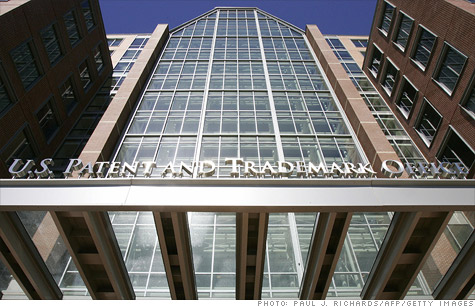
NEW YORK (CNNMoney) -- America's first significant patent reform in six decades is close to becoming law: It passed Congress on Thursday and President Obama has declared that he will sign the bill.He is also endorsing it as a part of his job creation agenda.The bill brings changes that will help the U.S. Patent and Trade Office issue higher-quality patents at a faster clip -- a fix all sides agree is urgently needed. Advocates have been pushing for years for this overhaul, and even the bill's critics support parts of the legislation that will generate funding for the patent office.But is patent reform going to jump-start employment? Proponents say it will create 200,000 new jobs -- but like so many job-creation predictions, this one is almost impossible to pin down.Several news reports have attributed that figure to Patrick Leahy, chairman of the Senate Judiciary Committee, and Majority Leader Harry Reid. But Leahy's aides say the senator has shied away from attaching hard numbers to the patent reform bill. Sen. Reid did not respond to multiple requests for comment.
Sen. Leahy's office, however, pointed to two different studies as support for the idea that patent reform will be a job-creating engine: a white paper issued last year by the Commerce Department and a 2008 study drafted by researchers from the University of California, Berkeley.Both studies are extremely limited in scope and don't offer the rock-solid evidence of job creation that patent reform proponents are touting.There are two things just about everyone agrees on: Patents can play a critical role for startups in securing funding from investors, and the tie between patents and jobs is particularly clear in the pharmaceutical industry.The Commerce Department's white paper cited studies that reiterated those two points. But extrapolating widespread benefit for all industries was solely the opinion of the Obama administration -- and that gets into a swampier set of assumptions and projections.The Berkeley study was narrowly focused on startups. It concluded that each patent granted to those businesses creates, on average, between three and five jobs. Yet the study's authors shied away from making general assumptions based on their research."There is no principled way to determine from our data whether or not additional patents lead to additional jobs, much less the number of jobs created by each patent," the authors said in a recent guest post on patents blog Patently-O.So the 200,000-job figure appears to have been concocted through some back-of-the-envelope math. Some advocates like to throw around even more bullish projections. The director of the patent office frequently says "millions" of jobs will be created as a result of the bill.
Want jobs? Fix the patent system
0:00 / 3:55 Want jobs? Fix the patent system
On the flip side, some believe the bill might do more harm that good on the employment front."The patent bill will create jobs -- jobs for patent attorneys, but not too many other people," said Jim Bessen, fellow at Boston University School of Law. "In most sectors of the economy today, patents decrease jobs rather than increase them."A BU study written by Bessen in March found that the costs of litigation and associated costs with patents outstripped whatever other benefits companies got from them. Patents, in effect, act as a tax on innovation, Bessen said."There are deep problems in the patent system that lead to litigation, and this bill doesn't address that," he added.Google (GOOG, Fortune 500) highlighted this problem in a recent blog post. It says that patent battles have thwarted innovation and forced companies to pay large sums of cash for giant patent portfolios as protection -- cash that otherwise could have been used to invest in the company. Ironically, Google has been one of the tech industry's most robust hirers and innovators, but it has one of Silicon Valley's smallest patent portfolios.
"I'm rather skeptical that the bill will make much difference in job creation," said Brian Kahin, research fellow at Harvard's Kennedy School of Government and a former White House senior technology policy adviser for the Clinton administration."Intuitively, it would be helpful, but with the ongoing patent wars, that money's not going into jobs -- it's going into failed companies and speculators' wallets," he said. "Nothing in the bill helps that situation."The view from the trenches. Can any company point to jobs directly attributable to patents?
Well, there's i4i, which successfully sued Microsoft for patent infringement in an historic case that went all the way to the Supreme Court.The company developed enterprise document collaboration technology and filed for a patent on it in 1994. I4i didn't wait for its patent grant before it started commercializing its invention: The founders got funding (having a patent pending helped woo investors, they say) and started hiring, growing quickly to 150 employees. The patent was granted in 1998.But in 2002, i4i's sales vanished. Customers that seemed about to close major deals suddenly pulled out."We had what we thought was an inexplicable reversal of fortune," i4i Chairman Loudon Owen recalled. "We spent the next two years looking long and hard and trying to figure out what happened."Struggling for survival, i4i slashed its headcount to 10 employees and pinched every penny it could. At one point the company unscrewed every second light bulb in its office to save on electricity costs.
In late 2003, the mystery of the vanished sales cleared up: Microsoft released a new version of Microsoft Word with a technology very similar to the one i4i had patented. Knowing that feature was coming, a significant number of potential i4i customers had opted to go instead with Microsoft's less-expensive offering.
"We felt like we were protected, but we were naive," Owen said. "Having a patent doesn't mean you're fully protected."I4i went to the mat. In 2007 it launched a long, expensive court battle that ultimately cost $10 million. The finale came at last in June -- more than four years later -- when the U.S. Supreme Court upheld a ruling requiring Microsoft (MSFT, Fortune 500) to pay i4i $290 million.But i4i's staff headcount has never recovered. The company gradually rebuilt and now has around 30 full-time employees, but it relies heavily on outside sales channels and doesn't plan to go back to having its own large, internal sales force.So did i4i's patents create -- or at least protect -- jobs? Owen thinks so. He said his company might not have survived without the protection they afforded.But as his saga illustrates, the "patents = jobs" math isn't nearly as simple, or as certain, as politicians would like it to be.

Editor's note: Scott Steinberg is the head of technology and video game consulting firm TechSavvy Global, as well as the founder of GameExec magazine and Game Industry TV. A celebrated business keynote speaker, he frequently appears as an on-air technology analyst for ABC, CBS, NBC, FOX and CNN.
(CNN) -- Google's social network, Google+, recently sent tremors through the gaming world with the announcement that it would be launching a new social games service.But despite offering players 16 games, from Angry Birds to Bejeweled Blitz, and providing software developers more generous financial terms than competitors, it's dubious whether there's any real danger to rival Facebook.Currently offering a small selection of digital diversions, many available from numerous other devices and sources, Google's initial library of games doesn't raise the bar for quality or innovation.
What's more, with an audience of 25 million users as compared to the nearly 800 million on Facebook, Google+ isn't suddenly going to topple Mark Zuckerberg's electronic entertainment empire overnight.
Given the thousands of titles already available on rival social networks, with dozens more released every day, it probably won't be the first place bored office drones look for entertainment either.Still, as game makers from PopCap ("Plants vs. Zombies") to Rovio ("Angry Birds") and Electronic Arts ("The Sims Social") are aware, to dismiss the considerable opportunity that Google+ presents would be a fatal error.Not only does the social network present a massive chance to greatly expand social gaming's reach and grow the audience for interactive entertainment as a whole -- it's also a prime opportunity for developers to hedge their bets on Facebook by creating another channel through which to sell high-quality, intuitive and free to play games.With the market for virtual goods pegged somewhere around $1-to-$2.1 billion in revenue in 2011 by industry insiders, there's considerable extra money to be made hawking new buyers their simulated clothes, cars and power-ups.Moreover, given Google's announcement that it would take only 5% of payments made to game companies for now, as opposed to the 30% toll demanded by Facebook, developers have added incentive to take the plunge.Bolstering creators' bottom line, such efforts may provide greater windfalls, at least for a short while, that can be reinvested into more sophisticated and enjoyable games.
Above all else, however, Google's foray into social games provides some protection should Facebook decide to change the rules, up fees or meddle with an already delicate situation, with most games and developers currently struggling to gain visibility.On social networks, power is already beginning to consolidate in the hands of giants like Zynga, Playdom and Electronic Arts, whose large audiences and deep pockets make an ever-shifting array of new releases easier to find. Once a bastion for independents, advertising and well-known brands are rapidly beginning to outpace creativity and innovation as the catalyst for success in these play environments, as in the traditional video games business.
If Google+ blossoms, unlike Buzz and Orkut, it presents what's possibly fertile new ground for scrappier competitors to colonize and cultivate.For now, putting a game on Google+ isn't about reaping huge returns, raising the bar for innovation or unseating reigning titans. It's a means to establish an early beachhead that can possibly produce decent returns and, more importantly, help build brands and create user awareness before an oncoming tidal wave of competition arrives.
All but certain to inspire another social gaming gold rush, Google+ appears to be the next battleground in a coming war for players' hearts and minds. Whether it'll also be the best place to kill five minutes between filing sales reports or just one of many nondescript options for idling away the time going forward, well... For now, it's too early to say who'll really emerge ahead of the game.
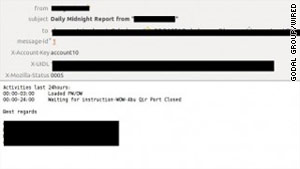
affidavits and other documents related to litigation in which the companies were embroiled, and trade secrets, such as contracts for business transactions."Twenty gigs of data is a lot of data in six months of really doingnothing,"said researcher Peter Kim from the GodaGroup. "And nobody knows this is happening."
Doppelganger domains are ones that are spelled almost identically to legitimate domains, but differ slightly, such as a missing period separating a subdomain name from a primary domain name -- as in the case of seibm.comopposed to the real se.ibm.com domain that IBM uses for its division in Sweden.Kim and colleague Garrett Gee, who released a paper this week (.pdf) discussing their research, found that 30%, or 151, of Fortune 500 companies were potentially vulnerable to having e-mail intercepted by such schemes, including top companies in consumer products, technology, banking, internet communication, media, aerospace, defense, and computer security.
The researchers also discovered that a number of doppelganger domains had already been registered for some of the largest companies in the U.S. by entities that appeared to be based in China, suggesting that snoops may already be using such accounts to intercept valuable corporate communications.Companies that use subdomains -- for example, for divisions of the firm located in different countries -- are vulnerable to such interception and can have their mail intercepted when users mistype a recipient's e-mail address.All an attacker has to do is register a doppelganger domain and configure an e-mail server to be a catch-all to receive correspondence addressed to anyone at that domain. The attacker relies on the fact that users will always mistype a certain percentage of e-mails they send.
"Most of the [vulnerable companies] only had one or two subdomains," Kim said. "But some of the large companies have 60 subdomains and could be really vulnerable."WIRED: More on Threat LevelTo test the vulnerability, the researchers set up 30 doppelganger accounts for various firms and found that the accounts attracted 120,000 e-mails in the six-month testing period.The e-mails they collected included one that listed the full configuration details for the external Cisco routers of a large IT consulting firm, along with passwords for accessing the devices. Another e-mail going to a company outside the U.S. that manages motorway toll systems provided information for obtaining full VPN access into the system that supports the road tollways. The e-mail included information about the VPN software, usernames, and passwords.The researchers also collected an assortment of invoices, contracts and reports in their stash.One e-mail contained contracts for oil barrel sales from the Middle East to large oil firms; another contained a daily report from a large oil firm detailing the contents of all of its tankers that day. A third e-mail included ECOLAB reports for a popular restaurant, including information about problems the restaurant was having with mice. ECOLAB is a Minnesota-based firm that provides sanitizing and food safety products and services to companies.Company information wasn't the only data at risk of interception. The researchers were also able to gather a wealth of employee personal data, including credit card statements and information that would help someone access an employee's online bank accounts.WIRED: State department cables unleashed onlineAll of this information was obtained passively by simply setting up a doppelganger domain and e-mail server. But someone could also do a more active man-in-the-middle attack between entities at two companies known to be corresponding.
The attacker could set up doppelganger domains for both entities and wait for mistyped correspondence to come in to the doppelganger server, then set up a script to forward that e-mail to the rightful recipient.For example, the attacker could purchase doppelganger domains for uscompany.com and usbank.com. When someone from us.company.com mistyped an e-mail addressed to usbank.com instead of us.bank.com, the attacker would receive it, then forward it on to us.bank.com.As long as the recipient didn't notice the e-mail came from the wrong address, he would reply back to it, sending his reply to the attacker's uscompany.com doppelganger domain. The attacker's script would then forward the correspondence to the correct account at us.company.com.
Some companies protect themselves from doppelganger mischief by buying up commonly mistyped variations of their domain names or having identity management companies buy the names for them. But the researchers found that many large companies that use subdomains had failed to protect themselves in this way.And as they saw, in the case of some companies, doppelganger domains had already been snatched up by entities who all appeared to be in China -- some of whom could be traced to past malicious behavior through e-mail accounts they had used before.WIRED: Google certificate hackers may have stolen 200 othersSome of the companies whose doppelganger domains have already been taken by entities in China included Cisco, Dell, HP, IBM, Intel, Yahoo and Manpower. For example, someone whose registration data suggests he's in China registered kscisco.com, a doppelganger for ks.cisco.com. Another user who appeared to be in China registered nayahoo.com -- a variant of the legitimate na.yahoo.com (a subdomain for Yahoo in Namibia).
Kim said that out of the 30 doppelganger domains they set up, only one company noticed when they registered the domain and came after them threatening a lawsuit unless they released ownership of it, which they did. He also said that out of the 120,000 e-mails that people had mistakenly sent to their doppelganger domains, only two senders indicated they were aware of the mistake.(WIRED) -- Two researchers who set up doppelganger domains to mimic legitimate domains belonging to Fortune 500 companies say they managed to vacuum up 20 gigabytes of misaddressed e-mail over six months.
The intercepted correspondence included employee usernames and passwords, sensitive security information about the configuration of corporate network architecture that would be useful to hackers,One of the senders sent a follow-up e-mail with a question mark in it, perhaps to see if it would bounce back. The other user sent out an e-mail query to the same address with a question asking where the e-mail had landed. Companies can mitigate the issue by buying up any doppelganger domains that are still available for their company.But in the case of domains that may already have been purchased by outsiders, Kim recommends that companies configure their networks to block DNS and internal e-mails sent by employees that might get incorrectly addressed to the doppelganger domains.This won't prevent someone from intercepting e-mail that outsiders send to the doppelganger domains, but at least it will cut down on the amount of e-mail the intruders might grab.
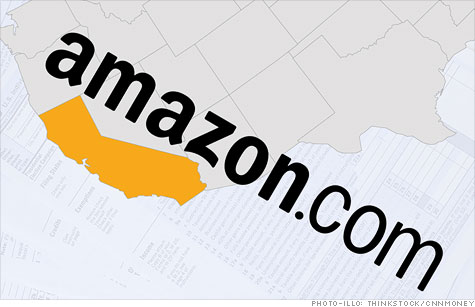
NEW YORK (CNNMoney) -- Amazon has struck a deal with lawmakers that will give the company one more year before it must start collecting sales tax on purchases made in California.As part of the agreement, which was reached late Wednesday, Amazon has promised to back off fighting a new state law that would have compelled it to collect the tax.Now Amazon has until July 31, 2012, to lobby Congress for a federal solution.
Right now, online retailers face a patchwork of local laws, requiring them to collect sales tax in some states but letting them skip it in others. Amazon has fought hard against local levies but says it would support a "simple, nationwide system of state and local sales tax collection."California's sales tax kerfuffle started back in June, when California Governor Jerry Brown approved an $86 billion budget that imposed deep spending cuts. Under that law, Amazon and other out-of-state online retailers would be required to collect California sales taxes if they had affiliates, offices, workers or other ties to the state.Amazon's affiliates program provides a commission to website or blog operators who refer shoppers to the retailer's site. Amazon, which has had associates in California for more than a decade, works with 10,000 affiliates there.Brown's measure was expected to add $200 million to California coffers. But the same day the bill was signed into law, Amazon (AMZN, Fortune 500) announced it would terminate its relationship with its California associate. It called the legislation "unconstitutional and counterproductive."
Instead, Seattle-based Amazon wrote up a referendum challenging the law and spent boatloads of cash collecting signatures for it. Last week, the company sweetened the pot: It offered to build distribution centers in California and hire workers in the state."Amazon throws around a lot of money," said Assemblyman Charles Calderon, a Democrat, who helped broker the agreement. "It's not your typical corporate community. They floated their own proposal. They have an aggressive business plan, and they are wiling to take risks."Calderon calls the 12-month push down the road a "grace period," and he said "a national solution" from Congress would make things simpler for everyone.Amazon hasn't said whether or not it will reinstate its California affiliates. The company did not return a call seeking comment.Meanwhile, other states have passed the so-called "Amazon tax" in recent years. Those include Connecticut, Illinois, New York, North Carolina, Arkansas and Rhode Island. Amazon dropped its associates program in all those states, except New York, where it has a brought a lawsuit against the state.
 "Margaritaville Online" will launch in the next two months, Jimmy Buffett says
"Margaritaville Online" will launch in the next two months, Jimmy Buffett saysEditor's note: John Gaudiosi is the co-founder and editor-in-chief of Gamerlive.tv video syndication network. He's covered video games for hundreds of outlets over the past 20 years, from Forbes to The Hollywood Reporter, and produces 3-D television and online content for outlets like DirecTV and NVIDIA 3-D Vision Live.
(CNN) -- In this economy, it might be easier to grab a virtual margarita than a real one.Cue Jimmy Buffett's new Facebook game, "Margaritaville Online," which features all the best in Parrot Head storylines, mini-games and, of course, digital margaritas for the virtual Caribbean beach.Developed by Exploding Barrel Games in partnership with THQ, the social game's graphics look more like those in Wii games than the Farmvilles of the world. It's likely to appeal to the more than 600,000 friends who Buffett, the singer who is known for island-y hits like "Margaritaville" and "Cheeseburger in Paradise," has on Facebook.
The game's players explore 3-D virtual islands filled with music, mini-games and, of course, margaritas. Gamers can jump on a boat and tour friends' islands or interact with classic characters from Buffett's songs and books, including Captain Tony and Joe Merchant. There are also social games like limbo and drunken party pirates to play with friends.CNN sat down with Buffett at the E3 gaming conference this year to talk about the inspiration for this game and his video-game-playing habits.The following is an edited transcript.CNN: What are you doing at a video game conference?Buffett: I think we need an oasis here in the middle of this. E3 is kind of a sensory overload, but Margaritaville is now a game. It's been a fun and an interesting project. It's been a long road to see it go to fruition.CNN: Where did the idea for this video game come from?
Buffett: It came out of being fan-based. There were a lot of guys who were computer techs, engineers and gamers who were Parrot Heads, too. They came to me with this idea, so we followed it. To get into virtual games, I thought it was really cool. It's just basically fun.CNN: How involved were you with the creation of this game?
Buffett: I said to these guys, "You know me .You do your version of me, and then I'll come in and write over some stuff." I obviously know this world, having written the stories, the books and the songs, so it's been a collaborative effort all the way up the line. It was a lot of fun, so I was working with gamers along the way.
CNN: How does your concert experience translate into a video game?Buffett: You can take it home. (Laughs)For a lucky almost 40 years, I've been on a stage singing "Margaritaville" and doing our show, which has become a cult following unto itself.
The great thing is, our demographics tend to be younger than older. They go the other way, because people have raised their children on this music. They're obviously gamers and social networkers, so when the idea came to me, it was much more attractive than trying to pursue it as a movie or as some kind of long-form entertainment. It's instant gratification. And the fun you're having at the show, you can really take home. That's what intrigued me.CNN: Do you play video games?Buffett: I didn't before, but I got into this game. This is the first time I've actually seen it and played it. It was so much fun to play it, but then I had to step back and look at how cool the graphics are in it. While we were designing the games, I used my children, who are 17- and 20-year-olds, as my test market.CNN: What will players be able to do in "Margaritaville Online"?Buffett: It's like a quest game. The first thing is that I said was, "It can't be anywhere else." Action is the name of the game.
At E3, we're in the middle of games filled with explosions and people's heads getting split open. I wanted to create something different. We're just getting in a boat and going to an island. It had to start that way.
When you get to the island, there's Captain Tony's Bar. Many things that come out of songs and stories are all in the island. That was the great part. I got to really create Margaritaville. After 40 years of a great song, it gets a new life as a great game.CNN: Will you appear in the game as a character?Buffett: My music's in there, but we've got some other ideas as we go along. It just opened up Pandora's box in terms of what you could do, because I have so much content. You can create your own band, you can build your own bar, you can build your own boat ... all in a virtual world.CNN: How do you see this game world evolving?Buffett: I'm toying with ideas of taking it into the real world, where you could have a battle of the bands, or you could have people play in our band. That's the kind of involvement that I'm looking at in the future.CNN: Will this game connect to your restaurants?
Buffett: Yes. I see people in the parking lot of our shows before they go to the real show sending everyone virtual margaritas. We're going to find a way that if you're buying virtual goods, then you can redeem them with real goods because we do have real-world Margaritaville restaurants and hotels and things. I want to combine these two worlds.CNN: When will people be able to play "Margaritaville Online"?Buffett: We're looking at ... October at the latest. When we finish this tour in Las Vegas on October 27, that would be a great kickoff month. But I'd like to get it out there a little sooner, so we're trying.CNN: Will Parrot Heads be able to interact with you in this game?Buffett: They can. (Laughs) But you won't see my real name. I'll sneak in. I already have my pseudonyms picked out, because I know they'll track me quick.

(CNN) -- In this week's Tech Check podcast, Doug Gross, John Sutter and Stephanie Goldberg discussCEO Carol Bartz's frank, and foul-mouthed, response to her firing from Yahoo.
We also touch on the fact that Bartz, who says she warned the board revenue wouldn't be rising quickly, was one of the few female bosses in the technology world.
The crew talks about advances in robotics and other technology that were spurred by the September 11, 2001 attacks and how hardship often prompts innovation. (We also point out a website that's pulled together a week of TV reports on the 9/11 attacks).For our Reader Comments of the Week, Stephanie shares responses to a gadget hacker who has modified a TV remote control to automatically mute the sound when an annoying celebrity of your choice is mentioned. (Snooki? Trump? Kardashian? You decide!).
And our Tech Fail of the Week, for the second week in a row, is handed to an Apple employee for apparently leaking information about the upcoming iPhone. And it involves sushi.
To listen, click on the audio box to the left. To subscribe, you can add Tech Check to your RSS feed here or you can subscribe, or just listen, on iTunes.

NEW YORK (CNNMoney) -- Congress on Thursday passed legislation that will reform the U.S. patent system for the first time since the Truman administration.
In an 89-9 vote, the Senate overwhelmingly agreed to accept the bill, dubbed the America Invents Act. It passed through the House in March with a similarly lopsided 304-117 vote.
President Obama declared that he will sign the bill in the next week or so.
The sweeping bill attempts to improve upon the existing patent system by mandating three things:
Will patent reform really create 200,000 jobs?
Second, the patent reform bill will help provide adequate funding to the overwhelmed patent office by allowing it to set and keep its own fees. Currently, all patent-filing fees are sent to Congress, and the patent office is allocated a set amount that is unrelated to how many patents are filed for in a given year.
After the bill is signed, Congress will continue to allocate funds to the patent office, but any fees that the office collects in excess of its allocation would be placed into escrow. The patent office will then need to appeal to Congress to release those funds, allowing Congress to maintain a certain level of oversight.
The patent office currently examines roughly 500,000 applications every year. Under-funding has led to a 700,000-patent backlog and a three-year waiting period for the average patent to receive final approval.
David Kappos, director of the patent office, has estimated that the reform bill would bring in an additional $300 million, which the patent office could use to staff up and invest in much-needed IT resources. Over the course of several years, that could halve the backlog to 350,000 applications, Kappos said.
The patent office currently examines roughly 500,000 applications every year. Under-funding has led to a 700,000-patent backlog and a three-year waiting period for the average patent to receive final approval.
David Kappos, director of the patent office, has estimated that the reform bill would bring in an additional $300 million, which the patent office could use to staff up and invest in much-needed IT resources. Over the course of several years, that could halve the backlog to 350,000 applications, Kappos said.
Patent baron Myhrvold defends the system
Finally, the bill will create a post-grant review process intended to clear up legal battles before they start. The reform bill allows inventors or companies to contest the validity of a patent for nine months after it is issued. The patent office will then go back and review the case.The idea is to keep some of the expensive, lengthy patent fights out ofthe courts.
When signed into law, the legislation will mark the first significant change to the U.S. patent system since 1952.Despite the bipartisan support for a patent overhaul, it wasn't easy to get to this point: The bill was the product of more than six years of debate.And it's not without its critics. Some small business advocates say that the first to file system will impair their ability to beat giants -- and their armies of researchers and patent attorneys -- to the patent office. Academics are skeptical that the bill will do enough to protect inventors from costly, and potentially disastrous, patent disputes.
Even those who support it say the bill is far from perfect and will take years before it results in any kind of significant job creation. At the same time, proponents say that it is an important first step in overhauling a largely broken system.
"The bill may not be exactly what I would have written, nor is it exactly what any member of Congress would have written," Sen. Patrick Leahy, one of the bill's foremost champions, told CNNMoney. "But it is a significant -- and historic -- step forward in updating our antiquated patent laws."

Investigation comes just days after the Obama-backed solar panel maker files for bankrupcy. Here, Obama at the Solynrda plant with founder Chris Gronet.
NEW YORK (CNNMoney) -- FBI agents, acting with inspectors from the Department of Energy, raided the offices of solar panel maker Solyndra on Thursday, just days after the DOE-backed company filed for bankruptcy.A spokeswoman for the FBI in San Francisco confirmed the raid, but declined to offer further details. The DOE inspector general's office typically investigates allegations of fraud or wrongdoing at the agency and within entities the agency does business with.
Solyndra filed for bankruptcy last week, closing its Fremont, Calif., factory and laying off 1,100 workers. The falling price of traditional silicon-based solar panels was cited as the main reason for the closure. Solyndra made a more advanced panel that relied on less silicon. When its rivals' technology got cheaper, Solyndra's became less appealing.got cheaper, Solyndra's became less appealing.
The company's factory was built with a $535 million loan backed by the Department of Energy. It was touted by President Obama as one of the ways his administration is nurturing a new, jobs-creating clean energy economy.
The bankruptcy has drawn an outcry from lawmakers and others skeptical of Obama's green jobs push.
"The FBI raid further underscores that Solyndra was a bad bet from the beginning and put taxpayers at unnecessary risk," House Energy Chairman Fred Upton told the National Journal on Thursday. "President Obama's signature green jobs program went from a darling of the administration to bankruptcy to now the subject of an FBI raid in a matter of days."
What went wrong at Solyndra
Congressional hearings have been scheduled on the matter.
Solyndra did not immediately respond to a request for comment.
A DOE spokesman said that, while regrettable, the Solyndra bankruptcy will not affect the agency's overall loan guarantee program, which has backed nearly $40 billion in projects to date. They include everything from solar and wind to advanced biofuels and nuclear power.
"That is the nature of supporting emerging, innovative companies," said the agency spokesman, Damien LaVera. "In the long run we will have more successes than failures, and those companies will help lead America to a new era of productivity and global competitiveness."
Selling solar to the Marines - Ooh-rah!
It's unclear just how much taxpayers will ultimately lose in Solyndra's bankruptcy process, if anything. It's possible the company could emerge restructured and ready to compete. But it's also possible it could be broken up and sold off.
LaVera said that in a worse-case, liquidation scenario, the DOE is high on the list to get back at least some of the $527 million Solyndra drew from the loan.
There has been talk from critics that Solyndra received the money in part because one of the company's main financial backers, billionaire George Kaiser, is also a big Democratic campaign donor.
"That is absolutely untrue," LaVera said, noting that the loan application was submitted under the Bush administration and mostly complete by the time Obama took office.
"Sophisticated, professional private investors, who put more than $1 billion of their own money behind Solyndra, came to the same conclusion as the Department: that Solyndra was an extremely promising company with innovative technology and a very good investment," he said.
Hackers posted false messages about a fresh attack on New York's Ground Zero via NBC News' Twitter account
New York (CNN) -- Hackers accessed the Twitter account for NBC News on Friday and posted false messages about a fresh attack on New York's ground zero.
A group calling itself The Script Kiddies claimed responsibility for the hacking, which included three messages about a hijacked plane hitting the World Trade Center site just before 6 p.m.
NBC issued a statement Friday confirming the hacking and said it is "working with Twitter to correct the situation and sincerely apologize for the scare that could have been caused by such a reckless and irresponsible act."
Both Twitter accounts for NBC News and The Script Kiddies were suspended shortly after the tweets were posted.
The Script Kiddies, an offshoot of the hacker group Anonymous, are suspected in a similar hacking in July of the Fox News Twitter account. In that incident, the news channel's Twitter feed was used to falsely report that President Barack Obama had been killed.

Editor's note: Amy Gahran writes about mobile tech for CNN.com. She is a San Francisco Bay Area writer and media consultant whose blog, Contentious.com, explores how people communicate in the online age.
(CNN) -- Smartphones may attract nearly all of the marketing hype and news coverage, but comScore's latest statistics show that smartphones still comprise only a minority of the U.S. mobile market -- about 35%, as of July 2011.
The other 65% of U.S. mobile handsets in use are "feature phones" -- which tend to be much less expensive to buy and own. Often, these phones do not require a pricey two-year wireless service contract with hefty early termination fees.
Even though smartphones cost much more, these devices have been getting popular with U.S. consumers, even in light of the country's economic recession. After all, a 35% market share is nothing to sneeze at -- especially considering that smartphones have only been widely available in the U.S. for about five years.
At some point, a majority of U.S. mobile users will indeed own smartphones. But that shift won't happen as quickly as early forecasts anticipated.
Back in March 2010, the Nielsen Company proclaimed that smartphones would overtake feature phones by 2011. Specifically, they predicted that by the end of Q3 2011 (about a month from now), most U.S. mobile users would own smartphones.
That ambitious prediction doesn't seem to be panning out.
For over a year, comScore has been publishing monthly mobile-market-share statistics that show the percentage of U.S. smartphones. I've been tracking these figures. Based on this data, it looks like it'll be roughly October 2012 before smartphones actually take over as a majority of U.S. handsets.
That's about a year later than Nielsen's forecast.
Even then, there will still be plenty of feature phones in the U.S. market for quite a while. They're definitely not vanishing any time soon.
What might speed up or slow down the proliferation of smartphones in the U.S.?
It's mostly a cost-benefit tradeoff. Decisions about which mobile phone to purchase are driven by functionality (what people want to do with their phones), access (the quality, speed, and geographic availability of local wireless networks), cost (both up-front and monthly bills), and flexibility (the ability to switch carriers, plans, or to cancel at will).
Right now smartphones win in terms of functionality because people can use apps to do almost anything a much bulkier computer would let them do. Still, many consumers prefer simpler phones, and view the mobile app frenzy as a confusing and unnecessary excess. This market segment (and it's not just determined by age, education, or income) will probably keep using feature phones the longest.
Access divides on urban and rural lines. Once you get outside of major metro areas, wireless coverage gets spottier. Also, carriers are very slow to roll out faster "4G" networks in less-populated rural areas. Using a smartphone on a slow or spotty data network can be pretty painful, and might not seem worth the extra cost.
In terms of overall cost and flexibility, feature phones are the clear winners -- which is probably why they remain so popular. It's easy to get a pretty good, no-contract feature phone for $50 or less (or even for free), and then get a month-to-month or pre-paid plan that allows Web browsing, e-mail, and other data access. That costs around $50 per month.
Generally users can cancel these phones at any time, with no early termination fee.
In contrast, smartphones typically cost $100 or more (sometimes much more) at a subsidized price on a two-year contract from a wireless service provider. Monthly bills typically start at $80-90, and if you want to cancel early you'll still owe the carrier up to a few hundred dollars for an early termination fee.
If the overall U.S. economy improves significantly -- and especially if lots more full-time jobs get created soon -- it's likely that smartphones would take over sooner. But if the recovery continues at its current pace or slows, feature phones could remain the majority into 2013 or beyond.
It's also possible that manufacturing advances could bring the cost of smartphones down. Or the major U.S. carriers might decide to offer more smartphones on more flexible and consumer-friendly terms. Personally, I'm not holding my breath for either of these outcomes.
The good news is that, for people who stick with feature phones, those devices aren't as limited as they used to be. One of the biggest areas of improvement in the U.S. feature phone market is the Web browser. Most feature phones come with some kind of Web browser, and users can opt to pay a little extra for a data plan that allows them to access the mobile Internet.
It used to be the case that feature phones came packaged with horrible, frustrating and slow browsers that displayed most Web pages poorly or not at all.
But now it's fairly easy for most U.S. consumers to find feature phones that include a much better pre-installed Web browser such as Opera Mini or Bolt. These display most Web pages pretty well and are easy to use, offering a vastly superior mobile browsing experience.
According to Per Wetterdal, Opera's U.S. regional manager, American consumers can currently purchase Opera Mini-equipped feature phones that don't require a two-year contract from AT&T and Virgin Mobile (a brand from Sprint) -- and by this holiday season also from Verizon. (The stock AT&T mobile browser is actually a branded version of Opera Mini.)
Discount carriers such as MetroPCS and third-party retailers such as Wal-Mart generally don't yet offer feature phones pre-installed with better proxy browsers. But any feature phone owners usually can download a better browser for free. The possible drawback is that once installed, it may take some extra clicks to launch.
Opera Mini and Bolt offer additional benefits that may appeal to smartphone owners, too. These browsers, and others like them, are "proxy browsers" which compress data significantly before transmitting it to the phone. This means they load Web pages faster, and they help control mobile data consumption.
So if you're on a tiered data plan, even if you own a smartphone it might be a good idea to install a proxy browser. Using it can help you avoid hitting your data cap, getting charged for overages, or even getting throttled. This will probably work well enough for most of your Web browsing, and you can switch to a fully-featured non-proxy browser for sites that warrant it.
Some proxy browsers are specifically designed for smartphones. Opera Mini offers versions for all smartphone platforms, Bolt has BlackBerry versions, and Skyfire offers Android and iOS versions that also play Flash video (something still not fully supported by Apple's Mobile Safari browser).
But if you want to stick with a feature phone for a while, don't worry too. You'll probably still get a good-enough mobile online experience if your phone has a decent mobile browser.

(CNN) -- This has been the year of social media crackdowns.
First there was Egypt, where the government shut down the Internet in January amid protests that toppled the 30-year rule of president Hosni Mubarak.
Then it was Libya, where something similar happened.
And, most recently, UK Prime Minister David Cameron said he was considering shutting down digital-communication channels during riots that had gripped the country. As CNN's Mark Milian reports, the UK has since backed down from that claim, but the discussion caused much controversy online.
Behind all of these happenings is a theory: That new-ish communications technologies -- from Facebook and Twitter to BlackBerry Messenger -- help people mobilize and revolt against governments. Tech insiders tend to see the Internet and social media as democratizing forces -- digital tools that can be used to topple dictators and spark change.
Perhaps Wael Ghonim, the Google employee who helped organize Egypt's revolution 2.0 over Facebook, put words to this theory best:
"If you want to liberate a society, just give them the Internet."
But what if that's not true?
That's essentially the argument of Navid Hassanpour, a political science graduate student at Yale, who writes in a recent and widely-talked-about paper that social media actually hurts a particular group's chance of organizing a meaningful and successful revolution.
"Social media can act against grass roots mobilization," he writes. "They discourage face-to-face communication and mass presence in the streets. Similar to more traditional and highly visible media, they create greater awareness of risks involved in protests, which in turn can discourage people from taking part in demonstrations."
He uses mathematical models to map out why this was the case in Egypt.
To put this in a pop-culture context, think about Facebook photos of your friends. To some degree, seeing what they're up to all the time could stop you from actually meeting up with them in person to communicate.
And that face-to-face interaction is key to political mobilization, Hassanpour says.
Here's how the New York Times explains it: "All the Twitter posting, texting and Facebook wall-posting is great for organizing and spreading a message of protest, but it can also spread a message of caution, delay, confusion or, I don't have time for all this politics, did you see what Lady Gaga is wearing?"
In the absence of all this digital buzz, he says, people organize.
"We become more normal when we actually know what is going on -- we are more unpredictable when we don't -- on a mass scale that has interesting implications," Hassanpour told the Times in an interview.
Hassanpour isn't the first to argue against the conventional wisdom that social media helps spark revolution.
Evgeny Morozov, a visiting scholar at Stanford University and author of the recent book "The Net Delusion: The Dark Side of Internet Freedom," says dictators use digital communications to track and crack down on dissenters.
"People who are concerned about freedom and democracy and creating democratic values abroad -- those of us in the West who are concerned about that -- we are probably far better off assuming the worst," he told CNN in February. "We are far better off assuming the Internet will strengthen dictators."
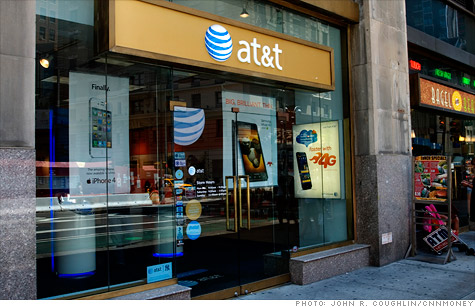
NEW YORK (CNNMoney) -- The U.S. Department of Justice filed an antitrust lawsuit against AT&T on Wednesday seeking to block its $39 billion merger with T-Mobile.
The merger would create the largest wireless company in the United States, combining AT&T's 98 million customers with T-Mobile's 34 million users, for a total of 130 million subscribers. AT&T is currently the second-largest wireless company by number of subscribers, and T-Mobile is fourth.
The DOJ said the merger would lead to a situation in which just two
companies -- the AT&T-T-Mobile combination and Verizon Wireless --
would dominate the mobile market. The new AT&T and Verizon would
account for more than two-thirds of wireless subscribers and 78% of the
wireless industry's revenues.
"We feel the combination of AT&T and T-Mobile would result in tens
of millions of consumers across the U.S. facing higher prices, fewer
choices, and lower quality products for wireless services," James Cole,
deputy attorney general, said in a press conference Wednesday.
AT&T must lawyer up in T-Mobile deal
The Federal Communications Commission, which oversees the wireless industry, is in the midst of its own review of the proposed merger.
Following the DOJ's announcement, FCC Chairman Julius Genachowski said that the agency also believes the merger raises "serious concerns about the impact ... on competition."
Shares of AT&T (T, Fortune 500) tumbled more than 4%.
Wayne Watts, AT&T's general counsel, said in a statement that the company was "surprised and disappointed by today's action." He went on to say that the company remained "confident that this merger is in the best interest of consumers and our country, and the facts will prevail in court."
AT&T has claimed that the merger is necessary in order to significantly expand its faster 4G wireless network to compete with Verizon (VZ, Fortune 500). Without the acquisition, AT&T says it would lack the necessary wireless spectrum and wherewithal to cover 97% of the U.S. population with 4G.
But the Justice Department said it didn't buy AT&T's argument. Following what the regulator called "an exhaustive investigation," the DOJ said it concluded that AT&T did not need to buy T-Mobile to remain competitive, and that the company could deploy next-generation technology by simply investing in its own network.
"AT&T had not demonstrated that the proposed transaction promised any efficiencies that would be sufficient to outweigh the transaction's substantial adverse impact on competition and consumers," the DOJ said in a statement.
Back-to-school smartphone shopping tips
Sprint (S, Fortune 500) and many of the smaller carriers have argued that the merger will harm competition and raise prices for consumers, because it would eliminate T-Mobile, the last low-cost carrier with a national footprint.
"By filing suit to block AT&T's proposed takeover of T-Mobile, the DOJ has put consumers' interests first," Vonya McCann, Sprint's senior vice president of government affairs, said in a written statement.
The DOJ said it concurred with the smaller carriers' opinions, noting that the agency filed the lawsuit to protect price competition. The regulator labeled T-Mobile as an important source of competition in the wireless market.
"Any way you look at this merger, it is anticompetitive," said Sharis Pozen, acting head of the DOJ's antitrust division. "It raised serious concerns, and we believe it violates the law."
The lawsuit does not necessarily mean the deal won't get done.
In April, the DOJ filed an antitrust lawsuit against Google (GOOG, Fortune 500), following its $700 million takeover bid for ITA, the world's largest airline search software company.
The DOJ and the search giant then quickly settled the claim, with the Justice Department approving the deal, provided that Google accept certain concessions and restrictions.
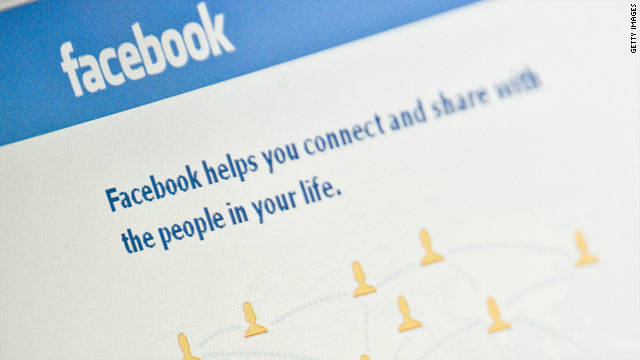
(Mashable) -- Facebook intends to launch its long-rumored music service next month with Spotify, MOG and Rdio as three of the company's launch partners, Mashable has learned.
The music and media platform will be announced at Facebook's f8 developer conference on September 22. It will allow users to listen to music from within Facebook.com. Evidence of Facebook's music platform first surfaced in the code of Facebook's video chat service.
According to two sources familiar with the matter, Facebook will not directly host or stream any music or media. Instead, it will rely on partners to provide the content. This is in contrast to Apple, Google and Amazon's strategy of hosting music content on their servers. Facebook's plan is to become a platform for media content in the same way it is a platform for applications and games.
One of our sources specifically mentioned three music services as launch partners: Spotify, Rdio and MOG. It's unclear whether Facebook has lined up other launch partners for its music platform or whether Facebook will open up its platform to other developers. One of our sources noted, however, that Facebook doesn't like playing favorites, so our bet is that Facebook will open up its music platform to other third-party developers.
We've also heard whispers that Facebook intends for this platform to go beyond music -- for example, it's possible that Netflix could stream movies through Facebook. However, we don't know if Facebook will go beyond the music platform announcement at f8.
Update: "There's nothing new to announce," a Facebook spokesperson told us. "Many of the most popular music services around the world are integrated with Facebook and we're constantly talking to our partners about ways to improve these integrations."
See the original article on Mashable.com
San Francisco (CNN) -- While much of the technology industry scrambles to embrace tablets as the next big thing, veteran Jonathan Kaplan is applying his tech savvy to a completely different market: grilled-cheese sandwiches.
Even stranger than that? He's not alone.
On Tuesday, the inventor of the Flip video camera opened the Melt, the first of a proposed chain of grilled-cheese restaurants, in the hip San Francisco neighborhood called SoMa, or South of Market.
Kaplan managed to talk Sequoia Capital, the venture-capital firm that funds tech startups, into backing his grilled-cheese venture. He plans to open a handful of Melts across the city in the coming months and 500 restaurants nationwide in the next five years.
And he's now going up against Heidi Gibson, a former Oracle manager, and Nathan Pollak, a former consultant for tech firms, including Oracle. The pair runs the American Grilled Cheese Kitchen, a year-old gourmet sandwich shop also in SoMa that has attracted Lady Gaga and other celebrities.
Pollak's take on Kaplan's heavily financed upstart sounds similar to one you might hear from a scrappy Web startup that's about to have its niche product emulated by Google or Facebook.
"I'm not looking at it so much as competition but more as 'coopetition,' " Pollak said last week. "The fact that grilled cheese is now a legitimate food business and someone is taking a gamble on 500 locations. ... All of a sudden, there's a grilled-cheese industry, and this is great."

While Pollak looks at his new restaurateur life as an escape from tech, Kaplan is shoehorning his industry knowledge into the Melt.
Kaplan had hardware manufacturers develop a special grill that can toast bread and cheese efficiently and reliably, with minimal effort from the staff. Kaplan tested the software -- yes, this grill runs apps -- over six months, tasting thousands of sandwiches until the process was tweaked to his liking, he said.
The Melt also deploys a mobile-ordering system that lets customers buy a sandwich on their phone and then scan a QR, or Quick Response code (those pixelated black-and-white squares) on the phone's screen when they arrive. The QR code triggers the grilling process; Kaplan hopes to deliver hot grilled-cheese sandwiches, which cost $5.95, within two minutes.
Other restaurants might be interested in licensing this technology, but the company has no plans to do so, said Michael Moritz, a Sequoia partner.
In addition to the prestige that comes with having Sequoia as an investor, the Melt has a powerhouse board of directors. Celebrity chef Michael Mina gives Kaplan advice on which soups to pair with which types of cheeses. Ron Johnson, the wizard of retail who directed the rise of the Apple Store and recently became CEO of J.C. Penney, is also on the board and provided capital.
Moritz and Johnson are betting on Kaplan because he has a history of successes. In addition to Pure Digital Technologies, the Flip camera maker that was bought by Cisco Systems in 2009 and shuttered two years later, Kaplan sold FamilyWonder, an entertainment-media company, to Sega.
"Jonathan is someone we've had a decade-long relationship with,"
Moritz said. "He's a man who can clearly express what he thinks it is
that will delight a consumer, whether it's a video camera or a
grilled-cheese sandwich."
Before the first location's opening,
Kaplan expounded on the parallels between his past consumer-electronics
ventures and sandwich shops while potential customers peeked through the
windows and tugged on the door
handles.a company, to Sega.
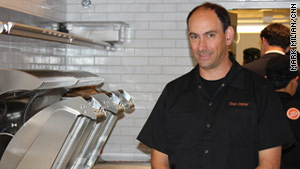
"I like consumers," Kaplan said. "This is totally 'consumer.' Look, there's a consumer coming through the door right now. I can't wait to talk to this guy."
The Melt is, by design, a business on a high trajectory, thanks to its factory-line infrastructure and fast-ordering tools. Kaplan's one regret is selling Flip to Cisco rather than taking it public, he said. This time, he's dedicated to a full-course meal.
"I know as much about the restaurant business as I knew about video cameras five years ago," Kaplan said. "Grilled cheese makes people happy. Food is fundamental to our daily lives."
top
- topTrue Music





















TOP POST
-
Euro is turning lower today, after some gains earlier. Now, though, the 17-nation currency is falling back as Forex traders try to determine...
-
The US dollar gained today as signs of an economic slowdown in China damped risk appetite of investors and made them to return to the safety...
-
Vietnam //
-
Name: Jin Mei XiEnglish name: Olwen Jin Date of birth: August 21, Place of birth: Shandong Province Yantai City, China Height: 175 cm Weig...
-
As you'll recall from yesterday, there was one small detail that stood out in Microsoft's announcement of a new preview program for...
-
Chinese Stunning Model Anata Wang Ying
-
The first of Dalao class was commissioned in 2010 and within one year, the second boat was launched. Quietly, PLAN's submarine force is ...
-
Elly Tran Ha is an American-borned-Vietnamese, who has recently moved back to Vietnam from the USA. She works as a part-time model while fur...
-
The Swiss franc was down for the second week as prospects of peg of the currency to the euro significantly reduced appeal of the fra...
-
Hot And Sexy Upcoming Actress Uthpala Madushani, Uthpala Madushani Hot, Uthpala Madushani Bikini, Uthpala Madushani sexy, Uthpala Madushan...
Total Pageviews
 2008 - 2009 SimplexDesign. Content in my blog is licensed under a Creative Commons License.
2008 - 2009 SimplexDesign. Content in my blog is licensed under a Creative Commons License.- SimplexPro template designed by Simplex Design.
- Powered by Blogger.com.









